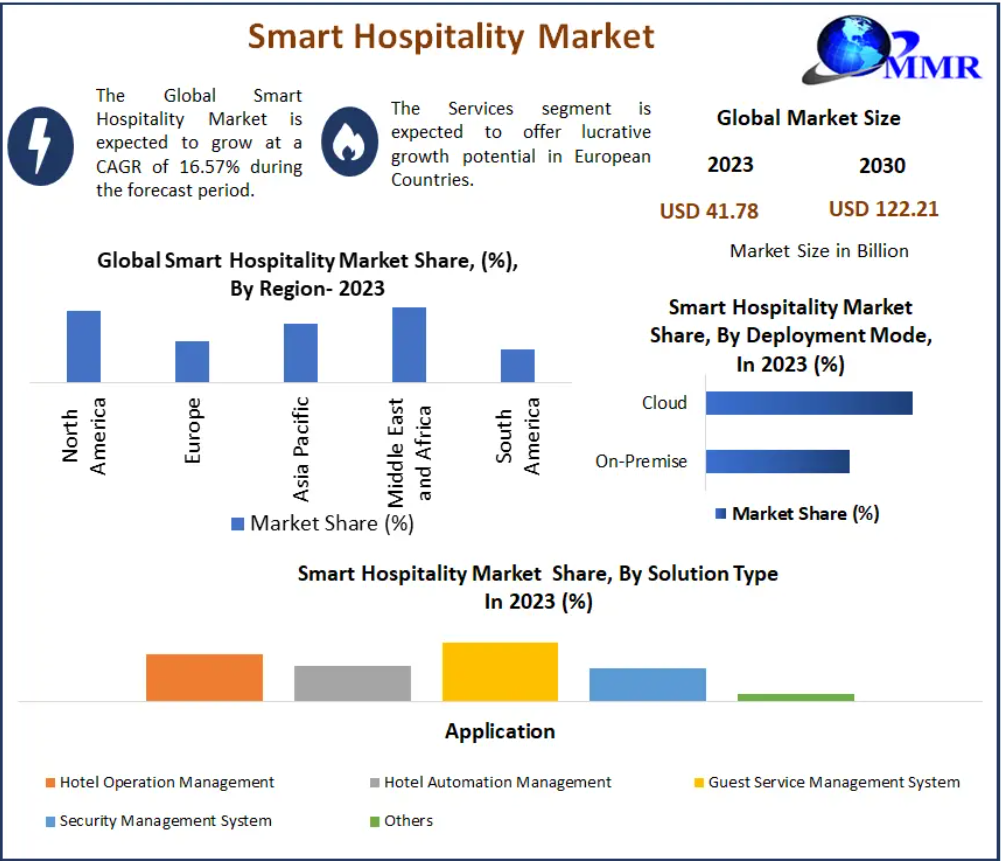Global Smart Hospitality Market Poised for Significant Growth Driven by Technological Advancements and Increased Investments
The Global Smart Hospitality Market Size is experiencing rapid expansion, driven by advancements in automation, artificial intelligence, and data-driven guest experiences. Valued at USD 41.78 billion in 2023, the market is projected to reach USD 122.21 billion by 2030, growing at a robust CAGR of 16.57% during the forecast period.
To Learn More About This Study, Please Click Here:https://www.maximizemarketresearch.com/request-sample/13824/
Market Estimation and Growth Drivers
Several key factors are driving the growth of the smart hospitality market:
-
Integration of Advanced Technologies – The adoption of Internet of Things (IoT) devices, artificial intelligence (AI), and automation solutions is revolutionizing hotel management, offering seamless and personalized guest experiences.
-
Enhanced Guest Experience – Smart room controls, automated check-in/out processes, and AI-powered concierge services are improving guest satisfaction and increasing repeat bookings.
-
Operational Efficiency – Hotels are leveraging smart technologies to streamline operations, reduce costs, and optimize energy consumption.
-
Sustainability Initiatives – Energy management systems and smart building technologies are enabling hotels to meet sustainability goals, reducing their environmental footprint.
U.S. Market Trends and Investments
The U.S. market is witnessing notable trends in 2024, particularly in luxury hotels that are integrating health and wellness technology to cater to high-end travelers. The increasing focus on medical wellness services, such as in-room health monitoring, AI-driven personalized fitness programs, and biometric-based room customization, is shaping the future of smart hospitality. Major hospitality chains are investing in automation and robotics to enhance customer service, improve efficiency, and address labor shortages.
Market Segmentation and Leading Segments
The smart hospitality market is segmented based on type, deployment, and hotel category. The following segments hold the largest market share:
-
Solutions Segment – This segment dominates the market, driven by increasing adoption of property management systems, guest experience platforms, and smart security solutions.
-
Business Hotels – Business-oriented hotels account for the largest market share, as they continuously invest in digital transformation to offer seamless services for corporate travelers.
Competitive Landscape
Several global companies are leading the smart hospitality market, driving innovation and expanding their product portfolios:
-
Schneider Electric – Specializes in energy management and automation solutions for hotels, enabling them to optimize energy usage and enhance sustainability.
-
Siemens AG – Offers building automation and control solutions that integrate with hotel management systems, improving operational efficiency.
-
IBM Corporation – Provides AI-driven analytics and cloud-based solutions that help hotels personalize guest experiences and improve security measures.
-
Honeywell International – Develops smart building solutions that enhance safety, energy efficiency, and comfort in hotels.
-
Cisco Systems, Inc. – Delivers networking and communication solutions that enable seamless guest connectivity and smart room automation.
These companies are actively investing in research and development to enhance their technological capabilities and meet the evolving demands of the hospitality industry.
To Access More Details Regarding This Research, Visit The Following Webpage:https://www.maximizemarketresearch.com/market-report/smart-hospitality-market/13824/
Regional Analysis
-
United States – The U.S. leads in adopting smart hospitality solutions, driven by continuous innovation, strong investments in hotel technology, and a focus on sustainability.
-
United Kingdom – Hotels in the UK are increasingly integrating digital concierge services and AI-based automation to enhance guest satisfaction.
-
Germany and France – The hospitality sector in these countries is prioritizing sustainability, with government policies supporting energy-efficient hotel infrastructure.
-
Japan – Japanese hotels are incorporating robotics and AI to enhance customer service and automate operations, responding to increasing labor shortages.
-
China – Rapid urbanization and the growing tourism industry are fueling the demand for smart hospitality solutions, with government support for digital transformation initiatives.
Conclusion
The global smart hospitality market is poised for substantial growth, fueled by technological innovation, increasing consumer demand for personalized experiences, and sustainability efforts. As the industry evolves, investing in AI, IoT, and automation will be key to maintaining a competitive edge. Businesses that prioritize smart solutions will not only enhance guest experiences but also drive operational efficiencies and long-term profitability.
